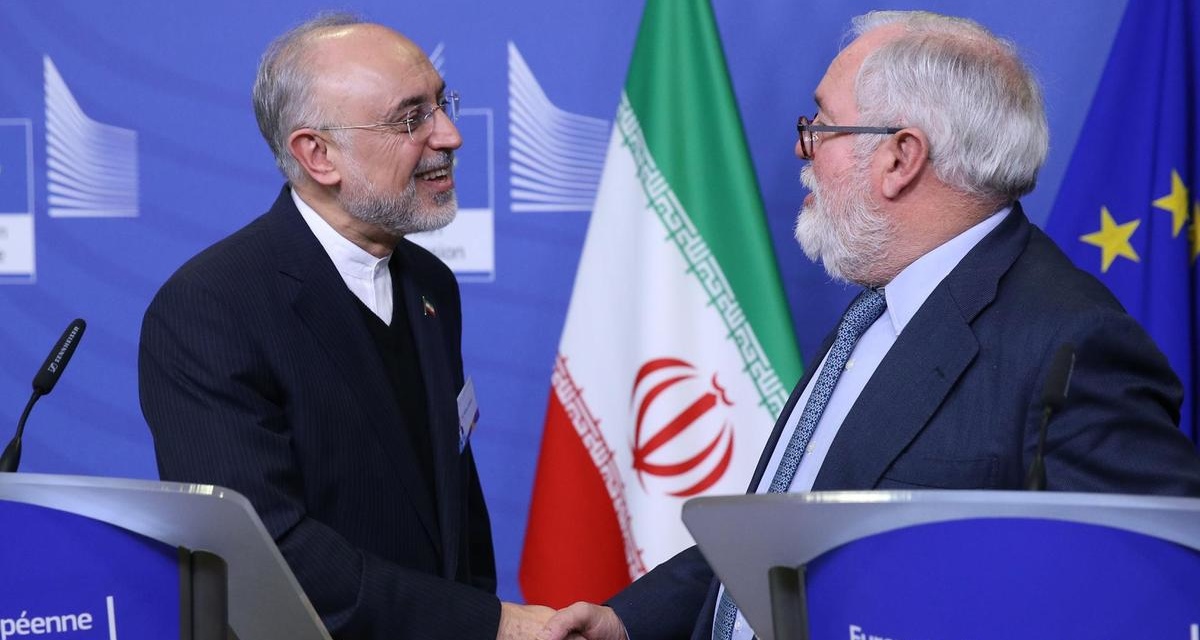Miguel Arias Canete (R), Commissioner of the European Commission in charge of Climate Action and Energy, and the head of the Atomic Energy Organisation of Iran. Ali Akbar Salehi, Brussels, Belgium, November 26, 2018 (AFP)
In a show of support for the 2015 nuclear deal, despite US withdrawal, the European Union has hosted Iran’s nuclear chief and its Deputy Foreign Minister.
However, there is still uncertainty over whether Europe can provide the trade and investment links sought by Tehran in the face of comprehensive US sanctions, including those on the energy and financial sectors imposed on November 5.
The head of Iran’s Atomic Energy Organization, Ali Akbar Salehi, addressed a seminar on peaceful nuclear cooperation in Brussels, Belgium on Monday. He criticized the Trump Administration’s pressure and threats, including on the EU, to prevent business with the Islamic Republic: “This unconstructive US approach shows that this country, as a permanent member of the [United Nations] Security Council, is not committed to its international obligations.”
Salehi said US was not adhering to agreements on global peace and security and declared Iran’s priority of extending “constructive interaction with the EU”.
Mixed Signals
But at the same time, Deputy Foreign Minister Abbas Araqchi showed concern that Europe could not confirm arrangements for trade and investment to bypass the US sanctions, with the threat of billions in dollars of fines on any companies retaining links with Tehran.
Araqchi proclaimed that the nuclear deal is in a “critical situation”: “This is a reality”. He said Iran’s benefits from sanctions removal under the agreeement had “nearly reached zero”.
The minister worried that European countries were not fulfilling an agreement for a Special Purpose Vehicle, bypassing the US dollar to trade in goods and commodities such as oil and gas. No EU country has agreed to host the SPV.
Last week Araqchi had been hopeful after visits by UK Foreign Minister Jeremy Hunt and a leading French diplomat to Tehran: “The political will of the European Union and the three European countries [UK, France, and Germany] to preserve the JCPOA [2015 nuclear deal] is still strong.”
Iran Daily, Nov 23: Tehran Hope Over European Link to Bypass US Sanctions
But yesterday Salehi echoed Araqchi’s concern, warning, “If words are not turned into deeds, then…it is very ominous, the situation would be unpredictable.”
He cushioned the statement with his belief that the EU is “doing its best”.
The EU has said it will provide guarantees for small- and medium-sized enterprises dealing with Iran, but has struggled to provide them for large companies, in the face of the threatened large US fines. That has led to firms such as France’s energy giant Total, French auto manufacturers Peugeot and Renault, Germany’s Siemens and Deutsche Bahn, French aircraft manufacturer Airbus, the world’s largest shipper Maersk, and European airlines suspending business with the Islamic Republic.

